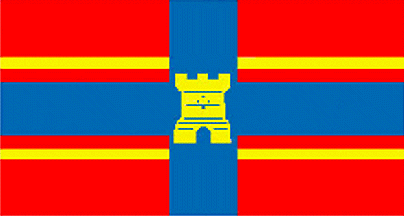 Derkwillem Visser jr. - VDCN.
Derkwillem Visser jr. - VDCN.
adopted on 13 July 1999

Last modified: 2006-12-09 by jarig bakker
Keywords: coevorden | castle | dalen |
Links: FOTW homepage |
search |
disclaimer and copyright |
write us |
mirrors
 Derkwillem Visser jr. - VDCN.
Derkwillem Visser jr. - VDCN.
adopted on 13 July 1999
The merger took place on 1 Jan 1998, and the new flag was adopted on
13 July 1999.
Franc Van Diest, 24 February 2001.
![[Coevorden CoA]](../images/n/nl-dr)cv.jpg) image from the Coevorden municipal website.
image from the Coevorden municipal website.
Granted 18 Aug 2000. The scroll reads (in Latin): Multis Periculis Supersum
- Despite the many dangers which threatened me I still exist.
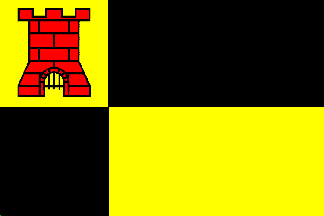 Shipmate Flagchart : http://www.flagchart.net
Shipmate Flagchart : http://www.flagchart.net
Adopted 2 Sep 1968
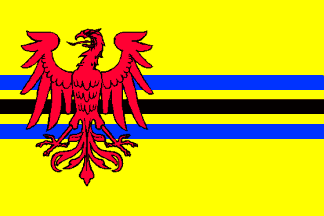 Shipmate Flagchart : http://www.flagchart.net
Shipmate Flagchart : http://www.flagchart.net
Description: seven stripes of yellow, blue, yellow, black, yellow, blue,
yellow, proportioned 5:1:1:1:1:1:5 with at ¼ flaglength a red heraldic
eagle of 3/4 flagheight.
![[Dalen villageflag]](../images/n/nl-dr0dl.gif) Shipmate Flagchart : http://www.flagchart.net
Shipmate Flagchart : http://www.flagchart.net
How to make a villageflag: Grab the old municipal flag, grab a tarbrush
and hey presto! Dalen is since 1999 part of the municipality of Coevorden
in Drenthe province. For 30 Euro one can buy the new villageflag, see this
webpage.
Jarig Bakker, 8 Oct 2006
![[Dalen CoA]](../images/n/nl-dr)dl.gif) image by Jarig Bakker, 8 Oct 2006
image by Jarig Bakker, 8 Oct 2006
Description: I. Or and eagle gules; II. noir a chimney-hanger or.
The municipalities of Dalen and Schoonebeek used to belong to the Manor
of Coevorden; the red eagle was its symbol, and it also signifies that
Dalen and Schoonebeek formed once one municipality. Schoonebeek
has the same eagle in its arms. The fire- or chimney-hanger ("vuurhaal"
or "schoorsteenhaal" on the shield is derived from the arms of the
ten Holte family, which gave several mayors to this municipality. The "vuurhaal"
was used in many Drentse farmhouses, reminding of the Saxon influence on
the nature of Drenthe rural villages.
Source: this webpage.
Jarig Bakker, 8 Oct 2006
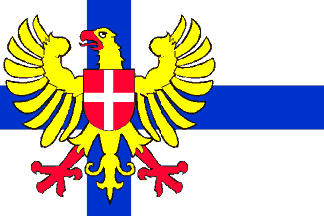 Shipmate Flagchart : http://www.flagchart.net
Shipmate Flagchart : http://www.flagchart.net
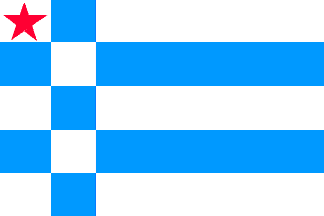 Shipmate Flagchart : http://www.flagchart.net
Shipmate Flagchart : http://www.flagchart.net
Sleen is now part of Coevorden in Drenthe, Netherlands.
The municipality of Sleen instituted a municipal flag by a resolution
of the municipal council of 25 June 1962. Description:
The flag is composed of five horizontal stripes of equal width, alternating
white and blue. To the hoist flanked by two vertical rows of five square
blocks, alternating white and blue too. The first block on the top has
a red five-pointed star, derived from the flag of Drente. In that flag
there are six stars, one for each 'dingspel' (old name for a municipality).
Sleen was the capital of the first dingspil "Het Zuidenveld".
Jarig Bakker, 2 August 1999.
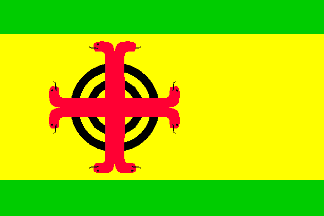 Shipmate Flagchart : http://www.flagchart.net
Shipmate Flagchart : http://www.flagchart.net
The municipal flag was designed by J. F. van Heijningen in Utrecht.
Granted by decree of the High Council of Nobility on 26 July 1988 #88/242-28.
The flag has been adopted as official municipal flag on 14 November 1988.
Description:
Three horizontal stripes green-yellow-green related 1:4:1 with on the
yellow stripe at 1/3 flaglenth two black concentric circles, each wide
about 7/200 of the total height of the flag; the rings with external diameters
of respectively 80/200 and 52/200 of the height of the flag and on it a
red, double cross of snakeheads with arms, of which the width is equal
to 9/100 of the flagheight and a total height, which is equal to 3/5 flagheight.
Explanation:
The yellow stripe with rings and cross mirror exactly the municipal
arms. The COA has been shifted a little to the hoist. They symbolize the
word 'LOO', meaning 'WOOD'. Zweeloo is situated in a beautiful wooded region.
To maintain the balance in the flag a green stripe has been added to the
top and the bottom. In that way the location of Zweeloo in a wooded area
has been expressed. The flag has been officially unveiled on 20 May 1989
by the Mayor, Mr. J. Jonkers.
Additional info from Kl. Sierksma's 'De gemeentewapens van Nederland',
1968:
'The double ring reminds of the ringurnfield near the 'Galgenberg'
(Gallow mountain). The snakehead-cross is a symbol for the early settlement
of Christianity in this region, which was then still a very rough country.'
The CoA and flag can also be seen at Ralf Hartemink's BNG-site:
http://www.bng.nl/ngw/z/zweelo.htm
With the following (IMHO better) explanation of the snakeheadcross:
'The cross in the Coat of Arms symbolizes Christianity, which arrived here
quite early. A snakehead-cross was chosen to symbolize the marshy condition
of the soil.'
Still: this flag would be quite fitting for Nagaland!
Jarig Bakker, 2 August 1999.